The history of India’s struggle for independence is etched with the valor and sacrifices of numerous selfless individuals, many of whom remain unsung heroes. Among these towering yet often overlooked figures are Raghu and Dibakar, whose stories are finely captured in the Odia biography, “Sahid Raghu – Dibakar,” authored by Satyabadi Baliarsingh and published in 1983.
With this biography, Baliarsingh offers a profound tribute to Raghu and Dibakar’s heroic contributions amidst the widespread fervor of the Indian freedom movement. Their exploits, interwoven with the fabric of Eastern India’s struggles, significantly bolster the collective narrative of the nation’s fight for freedom.
“Sahid Raghu – Dibakar” delves deeply into the early lives, motivations, and the socio-political conditions surrounding Raghu and Dibakar. Through meticulous research and compelling storytelling, Satyabadi Baliarsingh paints vivid portraits of these two revolutionaries, who embodied the undying spirit of resistance against colonial rule.
Raghu’s journey from a humble village in Odisha to becoming a crusader for independence is inspiring. His early life, marked by the hardships faced by the masses under British rule, ignited in him a fierce resolve to join the freedom struggle. Dibakar’s story similarly traces his evolution from a resolute youth to a committed nationalist, driven by the vision of a free India.
The book intricately details the movement both men were involved in, shedding light on their active participation in the Quit India Movement, non-cooperation movements, and various local uprisings. It serves as a testament to their strategic brilliance in organizing protests, galvanizing local support, and confronting the colonial apparatus.
“Sahid Raghu – Dibakar” also explores the solidarity and dynamism that characterized the resistance in Odisha. The biography delves into how these revolutionaries connected with influential freedom fighters from other parts of India, sharing strategies and fortifying the nationwide struggle against British imperialism.
An interesting layer in Baliarsingh’s narrative contrasts the oppressive colonial rule with the infrastructural advances by engineers like Joseph Bazalgette in Britain—a stark reminder of the dichotomy of colonialism. While Bazalgette is celebrated for transforming London’s sewage system, the colonies were systematically drained and oppressed. The parallel highlights the misallocation of progress, which could have benefitted colonized nations.
Baliarsingh’s work not only provides a biographical sketch but also situates Raghu and Dibakar within the broader tapestry of history. The book encapsulates the socio-economic terrain of early 20th century Odisha, entwining it with the larger geopolitical shifts. Through their own and the collective actions, Raghu and Dibakar left an indelible mark, which “Sahid Raghu – Dibakar” masterfully chronicles.
“Satyabadi Baliarsingh’s “Sahid Raghu – Dibakar” is more than just a biography; it is a beacon illuminating the untold sagas of bravery and the indomitable spirit of unsung heroes. Published in 1983, this 500-word encapsulation is a call to revisit and reflect upon the countless sacrifices made in the quest for freedom. Raghu and Dibakar’s enduring legacy of resistance and patriotism serves as an inspiration for generations, reminding us of the power of resilience and the profound impact of individual dedication to the national cause.
Books Info
| Books name | Sahid Raghu – Dibakar /ଶହୀଦ୍ ରଘୁ-ଦିବାକର |
| Author | Satyabadi Baliarsingh |
| No Of pages | 36 |
| Publisher | Kalinga Prakashana |
| Publication | 1983 |
| Printed At | Tip Top Printers |
| Distributor | NA |

